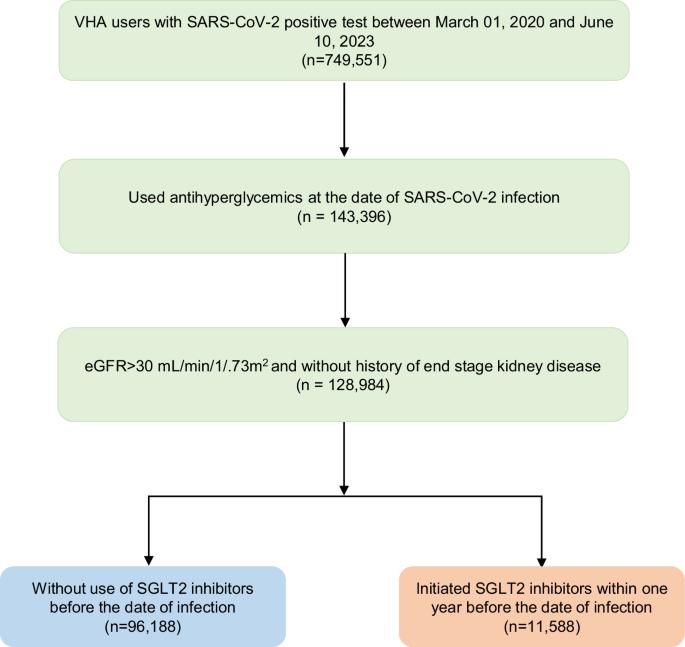Adverse cardiovascular and kidney outcomes in people with SARS-CoV-2 treated with SGLT2 inhibitors
IF 5.4
Q1 MEDICINE, RESEARCH & EXPERIMENTAL
引用次数: 0
Abstract
Whether use of SGLT2 inhibitors reduces the risk of cardiovascular and kidney events in people who contracted SARS-CoV-2 infection is not clear. We used the healthcare databases of the United States Department of Veterans Affairs to build a cohort of 107,776 participants on antihyperglycemic therapy and had SARS-CoV-2 infection between March 01, 2020 and June 10, 2023. Within them, 11,588 used SGLT2 inhibitors and 96,188 used other antihyperglycemics. We examined the risks of major adverse cardiovascular events (MACE)—a composite of death, myocardial infarction and stroke, and major adverse kidney events (MAKE)—a composite of death, eGFR decline > 50%, and end stage kidney disease after balancing baseline characteristics between groups through inverse probability weighting. Survival analyses were conducted to generate hazard ratio (HR) and absolute risk reduction per 100 person-years (ARR). Over a median follow up of 1.57 (IQR: 1.05–2.49) years, compared to the control group, SGLT2 inhibitors use is associated with reduced risk of MACE (HR 0.82 (0.77, 0.88), ARR 1.73 (1.21, 2.25)) and reduced risk of MAKE (HR 0.75 (0.71, 0.80), ARR 2.62 (2.13, 3.11)). Compared to the control group, SGLT2 inhibitors use is associated with reduced risk of the secondary outcomes of hospitalization (HR 0.94 (0.90, 0.98), ARR 1.06 (1.36, 1.76)), anemia (HR 0.71 (0.65, 0.76), ARR 2.43 (1.95, 2.90)), and acute kidney injury (HR 0.84 (0.79, 0.89), ARR 1.86 (1.29, 2.42)). Among people with SARS-CoV-2 infection on antihyperglycemic therapy, compared to those on other antihyperglycemics, those on SGLT2 inhibitors have less risk of adverse cardiovascular and kidney outcomes. SARS-CoV-2 infection leads to significant increase in risk of heart and kidney problems both shortly after infection and in the long-term. In this study, we evaluated whether SGLT2 inhibitors could reduce the risk of major adverse heart and kidney events in people with SARS-CoV-2 infection. SGLT2 inhibitors are a type of medication used to treat diabetes by lowering the amount of sugar in the blood. We compared a large group of people during and after SARS-CoV-2 infection and found that those who were using SGLT2 inhibitors had less major adverse heart and kidney problems than those who were using other types of sugar-lowering medications. Our findings could be useful for optimizing approaches to reduce risk of heart and kidney problems among people with diabetes and SARS-CoV-2 infection. Choi et al. report on the effectiveness of SGLT2 inhibitors in reducing risk of major adverse cardiovascular events (MACE) and major adverse kidney events (MAKE) in people with SARS-CoV-2 infection. They show that compared to other antihyperglycemics, SGLT2 inhibitors reduce the risk of both MACE and MAKE after SARS-CoV-2 infection.

使用 SGLT2 抑制剂治疗 SARS-CoV-2 患者的心血管和肾脏不良后果
使用 SGLT2 抑制剂是否能降低感染 SARS-CoV-2 的患者发生心血管和肾脏事件的风险尚不清楚。我们利用美国退伍军人事务部的医疗保健数据库,建立了一个包含 107,776 名在 2020 年 3 月 1 日至 2023 年 6 月 10 日期间接受降糖治疗并感染了 SARS-CoV-2 的参与者的队列。其中,11588 人使用 SGLT2 抑制剂,96188 人使用其他降糖药。通过反概率加权平衡各组间的基线特征后,我们研究了主要不良心血管事件(MACE)--死亡、心肌梗死和中风的复合风险,以及主要不良肾脏事件(MAKE)--死亡、eGFR下降> 50%和终末期肾病的复合风险。通过生存分析得出了每百人年的危险比(HR)和绝对风险降低率(ARR)。在中位随访 1.57(IQR:1.05-2.49)年期间,与对照组相比,使用 SGLT2 抑制剂可降低 MACE 风险(HR 0.82(0.77,0.88),ARR 1.73(1.21,2.25))和 MAKE 风险(HR 0.75(0.71,0.80),ARR 2.62(2.13,3.11))。与对照组相比,使用 SGLT2 抑制剂可降低住院(HR 0.94 (0.90, 0.98),ARR 1.06 (1.36, 1.76))、贫血(HR 0.71 (0.65, 0.76),ARR 2.43 (1.95, 2.90))和急性肾损伤(HR 0.84 (0.79, 0.89),ARR 1.86 (1.29, 2.42))等次要结果的风险。在接受降糖治疗的 SARS-CoV-2 感染者中,与接受其他降糖治疗的患者相比,接受 SGLT2 抑制剂治疗的患者发生心血管和肾脏不良后果的风险较低。感染 SARS-CoV-2 后,无论是感染后短期还是长期,心脏和肾脏出现问题的风险都会显著增加。在这项研究中,我们评估了 SGLT2 抑制剂能否降低 SARS-CoV-2 感染者发生重大心脏和肾脏不良事件的风险。SGLT2 抑制剂是一种通过降低血糖来治疗糖尿病的药物。我们对一大群人在感染 SARS-CoV-2 期间和之后的情况进行了比较,发现与使用其他类型降糖药物的人相比,使用 SGLT2 抑制剂的人较少出现重大心脏和肾脏不良问题。我们的发现有助于优化降低糖尿病和 SARS-CoV-2 感染者出现心脏和肾脏问题风险的方法。Choi 等人报告了 SGLT2 抑制剂在降低 SARS-CoV-2 感染者主要不良心血管事件 (MACE) 和主要不良肾脏事件 (MAKE) 风险方面的有效性。他们的研究表明,与其他降糖药相比,SGLT2 抑制剂能降低感染 SARS-CoV-2 后发生 MACE 和 MAKE 的风险。
本文章由计算机程序翻译,如有差异,请以英文原文为准。
求助全文
约1分钟内获得全文
求助全文

 求助内容:
求助内容: 应助结果提醒方式:
应助结果提醒方式:


